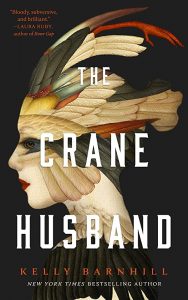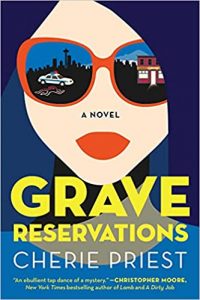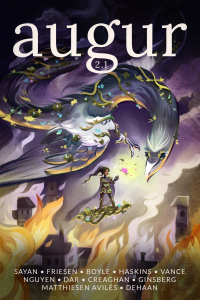Gary K. Wolfe Reviews The Crane Husband by Kelly Barnhill
 The Crane Husband, Kelly Barnhill (Tordotcom 978-1-250-85097-3, $19.99, 128pp, hc) February 2023.
The Crane Husband, Kelly Barnhill (Tordotcom 978-1-250-85097-3, $19.99, 128pp, hc) February 2023.
Kelly Barnhill’s When Women Were Dragons ranked pretty high on my list of last year’s outstanding fantasy novels, a highly original combination of feminist coming-of-age tale, alternate history period piece, and metamorphosis myth, all cast in the form of a memoir, or what used to be called a personal history. That combination of domestic realism and family strife with high-concept fantasy bordering on absurdism is at work again in The Crane Husband, which is a variant retelling of the Japanese folktale ‘‘The Crane Wife’’ (which gets briefly recounted in the text, and which was also the source of a Patrick Ness novel a few years ago). In Barnhill’s near-future version, the widowed mother of a rural Midwestern family shows up for dinner looking disheveled and bringing along an enormous wounded crane – complete with hat and glasses – whom she insists the children call Father. The children are the 15-year-old narrator and her six-year-old brother Michael, who live on farmland long since taken over by corporations who run all the regional farms remotely, using robot tractors and drones. The mother is a talented but distracted fabric artist who, even before the crane arrives, ‘‘lived in her own head sometimes,’’ leaving it up to the teenage daughter to manage household and business affairs, as did the similarly bright but rebellious teenager in When Women Were Dragons. At one point, the premise of that novel seems to be alluded to when the mother insists that ‘‘On the farm… mothers fly away like migrating birds,’’ while the fathers die young and the children find themselves saddled with unwelcome responsibilities.
Once the crane arrives, the dreamily infatuated mother becomes even more erratic and secretive. She no longer allows the children to visit her studio, where she hides out with the crane, supposedly working on some sort of tapestry masterpiece. (In the original tale, it’s the crane wife who produces her art in secret.) She grows gaunt and pale, showing up for breakfast with cuts and abrasions, which she shrugs off even as the daughter has to treat her wounds. The narrator is also left to deal with managing the family business (under the guise of a fictional online agent named Bruce), as well as fending off a snoopy social worker, her teachers, and her school principal. But as the mother’s distraction leads to declining sales of her art and of her artisan cheese, the family descends into near-poverty, until the narrator becomes convinced that she must face some dramatic choices.
As with When Women Were Dragons, Barnhill’s convincing depiction of a family under stress and a girl’s discovery of her own agency is far more interesting than the crane himself, who first shows up as an almost comical figure (with that hat and those spectacles) and later turns into an emblem of sexual obsession with more than a few undertones of toxic masculinity – a kind of cross between a cartoon bird and Stanley Kowalski. While the crane-mother relationship may be the main plot engine, the depiction of the mother’s commitment to her art is an insightful exploration of the relationship between inspiration and obsession. But the relationships that give the novella its deepest resonances are those between the narrator and her little brother, and (in a few flashbacks) with her late father. Like Kelly Link, Barnhill has a keen eye for the disturbing subtexts of a familiar tale, and a distinctive talent for making that tale her own, in this case through a shrewd combination of near-future SF, economic stress, family dynamics, and pure magic.
Gary K. Wolfe is Emeritus Professor of Humanities at Roosevelt University and a reviewer for Locus magazine since 1991. His reviews have been collected in Soundings (BSFA Award 2006; Hugo nominee), Bearings (Hugo nominee 2011), and Sightings (2011), and his Evaporating Genres: Essays on Fantastic Literature (Wesleyan) received the Locus Award in 2012. Earlier books include The Known and the Unknown: The Iconography of Science Fiction (Eaton Award, 1981), Harlan Ellison: The Edge of Forever (with Ellen Weil, 2002), and David Lindsay (1982). For the Library of America, he edited American Science Fiction: Nine Classic Novels of the 1950s in 2012, with a similar set for the 1960s forthcoming. He has received the Pilgrim Award from the Science Fiction Research Association, the Distinguished Scholarship Award from the International Association for the Fantastic in the Arts, and a Special World Fantasy Award for criticism. His 24-lecture series How Great Science Fiction Works appeared from The Great Courses in 2016. He has received six Hugo nominations, two for his reviews collections and four for The Coode Street Podcast, which he has co-hosted with Jonathan Strahan for more than 300 episodes. He lives in Chicago.
This review and more like it in the February 2023 issue of Locus.
 While you are here, please take a moment to support Locus with a one-time or recurring donation. We rely on reader donations to keep the magazine and site going, and would like to keep the site paywall free, but WE NEED YOUR FINANCIAL SUPPORT to continue quality coverage of the science fiction and fantasy field.
While you are here, please take a moment to support Locus with a one-time or recurring donation. We rely on reader donations to keep the magazine and site going, and would like to keep the site paywall free, but WE NEED YOUR FINANCIAL SUPPORT to continue quality coverage of the science fiction and fantasy field.
©Locus Magazine. Copyrighted material may not be republished without permission of LSFF.








@Gary K Wolfe: Who or what is the person referred to as “Link” in this sentence of your review: “Like Link, Barnhill has a keen eye for the disturbing subtexts of a familiar tale”?
I am referring to the review in the March 16, 2023 issue of Locus “Gary K. Wolfe Reviews The Crane Husband by Kelly Barnhill”.
Thank you for always writing perceptive and fair reviews, and introducing me to many worthwhile books.
From HQ: Kelly Link. In the magazine Gary’s column covers her new book just before the Barnhill, but since we split the reviews into singletons for the website, the occasional obscure reference slips in. Thanks for the note! We’ll edit for clarity.